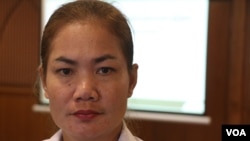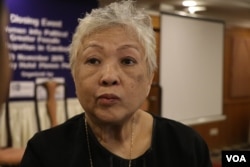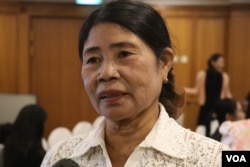Men Sophy, a grassroots politician from the ruling Cambodian People’s Party, has set her sights on the top job in the Battambang commune of Klaing Meas.
Like many women with political aspirations in Cambodia, Sophy, 38, is concerned that too few women are promoted into leadership roles in the male-dominated sector.
She remains the only woman councilor in the commune after six years in office.
“I want to see more female participation in politics,” she said. “It is good for our community to have more women participating.”
“Women’s knowledge is very limited and they rarely participate in community work,” she added.
Sophy is one of 120 female political leaders taking part in an E.U.-funded project aimed at increasing women’s participation in politics. The program, “Women into politics! Greater female participation in Cambodia”, is being implemented by several local organizations, including the Women’s Media Center of Cambodia, women’s rights group Banteay Srei, and German media group DW Akademie.
As well as Battambang, the project is targeting women in Siem Reap and Kampong Thom provinces.
Participants have received training in public speaking, communication and knowledge skills. Almost a quarter of participants were elected to local councils in 2017.
At a meeting on Thursday to conclude the project, Franck Viault, head of cooperation at the EU delegation to Cambodia, said it was “a very important project” in helping to re-balance the gender gap in politics in Cambodia.
He added that the dissolution of the Cambodia National Rescue Party last year had “affected the life of the project and beneficiaries of the project.”
Mann Champa, a former opposition party commune chief in Siem Reap, said the project had helped her be more courageous and confident” in advocating for women’s rights.
“I have confidence in myself and every decision made in the family and community,” said Champa, 37, adding that her husband also encouraged her to take part in social and political activities.
Champa, who has championed opposition causes for two decades, lost her job as commune chief during a purge of opposition officials following the CNRP’s dissolution.
Experts say women remain underrepresented in politics in Cambodia.
“There is still a limit,” said Thida Khus, executive director of rights group Silika, adding that at least 30 percent of leadership roles should be taken up by women.
“Don’t think about seniority. If women are capable, let them do it,” she said.
“In the family, a girl’s education is not really highly considered,” she added.
“They [men] don’t listen to women. Women are delegated with work related to cooking, cleaning or giving gifts to sick people, but the big decisions are made by men. Most men promote other men since they know each other well and they drink together.”
Despite 52 percent of Cambodians being women, only one in five lawmakers are women and they are rarely heard in parliament. Almost one in five of the 1,646 local authorities in Cambodia do not have any female representation.
Chhay Sat, deputy commune chief for Dounkeo in Siem Reap province, is one of two women sitting on the nine-member council.
“It is still very low. I want higher or at least equality,” she said. “There is still discrimination against women. In the voting ballot for the party, the names of women are at the bottom.”
“Girls don’t feel comfortable revealing their stories, like violence,to men,” she said.
Nin Chenda, the head of Banteay Srei in Siem Reap province, said in some cases women are not encouraged to take part in social and political work.
“Some women are not allowed by their husbands to join [politics]” she said.
“There is a woman who got divorced with her husband since she wanted to join politics.”
Government officials, however, maintain that the ruling Cambodian People’s Party is doing all it can to encourage women to take a greater role in politics, but Sok Eysan, party spokesman, claims there are not enough “adequately capable women” for the jobs.
“There is a lack [of qualified women],” he said, adding that “we need people who have enough qualifications to serve effectively.”









